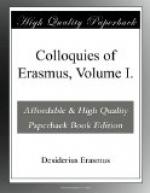teaches, is perfectly plain. The Pontiff himself
must declare with what intention he commands what
the Gospel does not require. Yet no one there
says—what I know not whether Luther teaches—that
the constitutions of the Pontiffs do not render us
liable to guilt, unless there has been contempt besides.
In fact, he who speaks in that passage grants that
the Pope may appoint an observance; he simply enquires,
whether this were the intention of the Pope, to bind
all equally to abstinence from meats, so that one
who should partake would be liable to hell-fire, even
although no perverse contempt should be committed.
And he who says this in the Colloquies, adds that
he hates fishes not otherwise than he does a serpent.
Now, there are some so affected that fish is poison
to them, just as there are found those who in like
manner shrink from wine. If one who is thus affected
with regard to fishes, should be forbidden to feed
on flesh and milk-food, will he not be hardly treated?
Is it possible that any man can desire him to be exposed
to the pains of hell, if for the necessity of his
body he should live on flesh? If any constitution
of Popes and Bishops involves liability to the punishment
of hell, the condition of Christians is hard indeed.
If some impose the liability, others not; no one will
better declare his intention than the Pope himself.
And it would conduce to the peace of consciences to
have it declared. What if some Pope should decree
that priests should go girt; would it be probable
that he declared this with the intention that if one
because of renal suffering should lay aside the girdle,
he should be liable to hell? I think not.
St. Gregory laid down, That if any one had had intercourse
with his wife by night, he should abstain the next
day from entering church: in this case, supposing
that a man, concealing the fact of intercourse having
taken place, should have gone to church for no other
reason than that he might hear the preaching of the
Gospel, would he be liable to hell? I do not
think the holiest man could be so harsh. If a
man with a sick wife should live on meat, because otherwise
she could not be provoked to eat, and her health required
food, surely the Pope would not on that account determine
him to be liable to hell! This matter is simply
made a subject of enquiry in the passage referred
to, and no positive statement is made. And certainly
before the Imperial Edict, men were at liberty to
enquire concerning these matters.
In point of fact, neither in that place nor elsewhere do I absolutely condemn the Indulgences of the Popes, although hitherto more than sufficient indulgence has been shown them. It is simply that a speaker ridicules his comrade, who, although in other respects the most frivolous of triflers (for so he is depicted), yet believed that by the protection of a Bull he would get safely to heaven. So far from thinking this to be heretical, I should imagine there was no holier duty than to warn the people not to put their trust in Bulls, unless they study to change their life and correct their evil desires.




